全新版大学英语综合教程教案
全新版大学英语综合教程第一册教案-Unit1
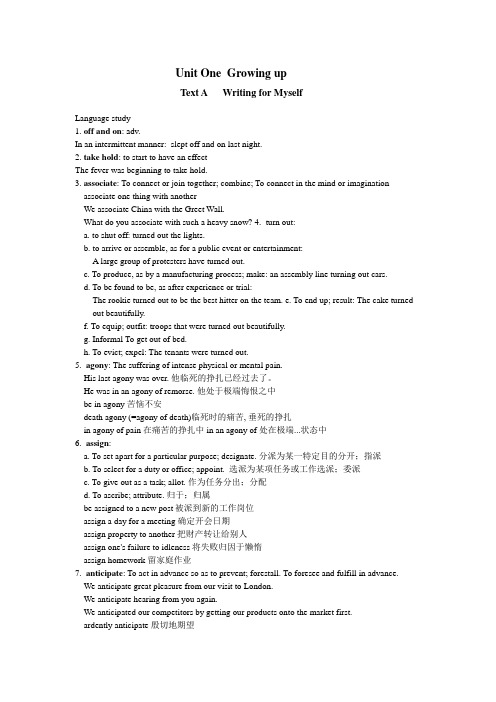
Unit One Growing upText A Writing for MyselfLanguage study1. off and on: adv.In an intermittent manner: slept off and on last night.2. take hold: to start to have an effectThe fever was beginning to take hold.3. associate: To connect or join together; combine; To connect in the mind or imagination associate one thing with anotherWe associate China with the Greet Wall.What do you associate with such a heavy snow? 4. turn out:a. to shut off: turned out the lights.b. to arrive or assemble, as for a public event or entertainment:A large group of protesters have turned out.c. To produce, as by a manufacturing process; make: an assembly line turning out cars.d. To be found to be, as after experience or trial:The rookie turned out to be the best hitter on the team. e. To end up; result: The cake turned out beautifully.f. To equip; outfit: troops that were turned out beautifully.g. Informal To get out of bed.h. To evict; expel: The tenants were turned out.5. agony: The suffering of intense physical or mental pain.His last agony was over. 他临死的挣扎已经过去了。
全新版大学英语综合教程第一册教案

College English Integrated CourseBook One Unit OneGrowing upLanguage study1.off and on: adv.In an intermittent manner: slept off and on last night.2.take hold: to start to have an effectThe fever was beginning to take hold.3.associate: To connect or join together; combine; To connect in the mind or imaginationassociate one thing with anotherWe associate China with the Greet Wall.What do you associate with such a heavy snow?4. turn out:a. to shut off: turned out the lights.b. to arrive or assemble, as for a public event or entertainment:A large group of protesters have turned out.c. To produce, as by a manufacturing process; make: an assembly line turning out cars.d. To be found to be, as after experience or trial:The rookie turned out to be the best hitter on the team.e. To end up; result: The cake turned out beautifully.f. To equip; outfit: troops that were turned out beautifully.g. Informal To get out of bed.h. To evict; expel: The tenants were turned out.5. agony: The suffering of intense physical or mental pain.His last agony was over. 他临死的挣扎已经过去了。
全新版大学英语综合教程4电子教案
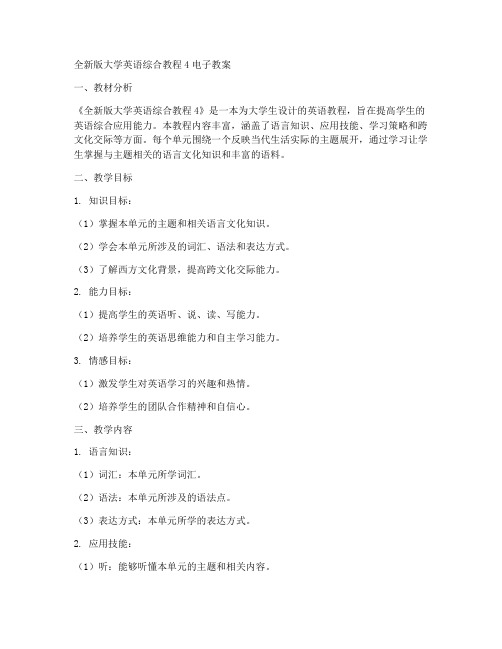
全新版大学英语综合教程4电子教案一、教材分析《全新版大学英语综合教程4》是一本为大学生设计的英语教程,旨在提高学生的英语综合应用能力。
本教程内容丰富,涵盖了语言知识、应用技能、学习策略和跨文化交际等方面。
每个单元围绕一个反映当代生活实际的主题展开,通过学习让学生掌握与主题相关的语言文化知识和丰富的语料。
二、教学目标1. 知识目标:(1)掌握本单元的主题和相关语言文化知识。
(2)学会本单元所涉及的词汇、语法和表达方式。
(3)了解西方文化背景,提高跨文化交际能力。
2. 能力目标:(1)提高学生的英语听、说、读、写能力。
(2)培养学生的英语思维能力和自主学习能力。
3. 情感目标:(1)激发学生对英语学习的兴趣和热情。
(2)培养学生的团队合作精神和自信心。
三、教学内容1. 语言知识:(1)词汇:本单元所学词汇。
(2)语法:本单元所涉及的语法点。
(3)表达方式:本单元所学的表达方式。
2. 应用技能:(1)听:能够听懂本单元的主题和相关内容。
(2)说:能够用英语进行日常交流,表达自己的观点。
(3)读:能够阅读并理解本单元的文章。
(4)写:能够撰写相关主题的短文。
3. 学习策略:(1)自主学习:学生能够自主学习课文,查找资料。
(2)合作学习:学生能够与同学共同完成任务,分享学习心得。
(3)策略运用:学生能够运用所学策略解决学习中的问题。
4. 跨文化交际:(1)了解西方文化背景:学生能够了解西方文化,提高跨文化交际能力。
(2)文化差异认识:学生能够认识并尊重文化差异。
四、教学过程1. 导入:(1)教师通过与本单元主题相关的问题,引导学生思考。
(2)学生分享与主题相关的个人经历或看法。
2. 新课内容展示:(1)教师讲解本单元的生词、语法和表达方式。
(2)学生跟随教师学习课文,理解文章内容。
3. 课堂活动:(1)小组讨论:学生分组讨论课文内容,分享学习心得。
(2)角色扮演:学生模拟课文中的场景,进行角色扮演。
4. 听力训练:(1)教师播放课文听力材料,学生跟随录音进行听力训练。
全新版大学英语综合教程3unit5教案
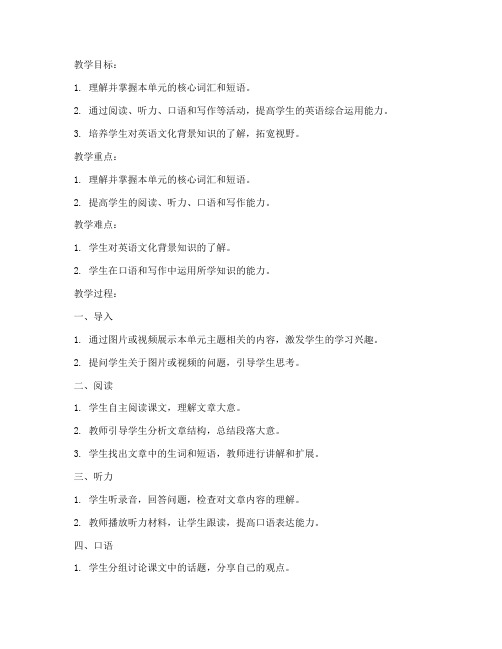
教学目标:1. 理解并掌握本单元的核心词汇和短语。
2. 通过阅读、听力、口语和写作等活动,提高学生的英语综合运用能力。
3. 培养学生对英语文化背景知识的了解,拓宽视野。
教学重点:1. 理解并掌握本单元的核心词汇和短语。
2. 提高学生的阅读、听力、口语和写作能力。
教学难点:1. 学生对英语文化背景知识的了解。
2. 学生在口语和写作中运用所学知识的能力。
教学过程:一、导入1. 通过图片或视频展示本单元主题相关的内容,激发学生的学习兴趣。
2. 提问学生关于图片或视频的问题,引导学生思考。
二、阅读1. 学生自主阅读课文,理解文章大意。
2. 教师引导学生分析文章结构,总结段落大意。
3. 学生找出文章中的生词和短语,教师进行讲解和扩展。
三、听力1. 学生听录音,回答问题,检查对文章内容的理解。
2. 教师播放听力材料,让学生跟读,提高口语表达能力。
四、口语1. 学生分组讨论课文中的话题,分享自己的观点。
2. 教师组织学生进行角色扮演,模拟课文中的场景。
五、写作1. 学生根据课文内容,完成一篇短文写作。
2. 教师对学生的写作进行点评,指出优点和不足。
六、总结1. 教师对本单元所学内容进行总结,强调重点和难点。
2. 学生回顾本单元所学知识,提出疑问。
教学资源:1. 教材《全新版大学英语综合教程3》2. 多媒体课件3. 课外阅读材料4. 听力材料教学评价:1. 学生对课堂活动的参与度。
2. 学生对课堂内容的掌握程度。
3. 学生在写作和口语表达中的表现。
教学反思:1. 教师应根据学生的实际情况,调整教学策略,提高教学效果。
2. 注重培养学生的英语综合运用能力,提高学生的英语水平。
全新版《大学英语》综合教程第二册教案
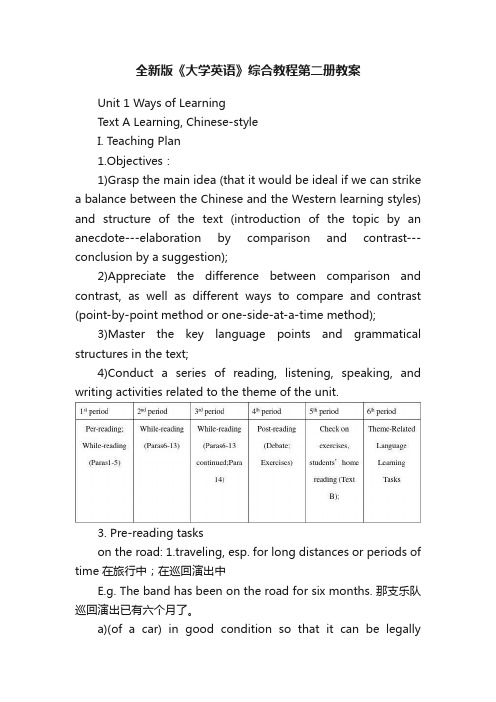
全新版《大学英语》综合教程第二册教案Unit 1 Ways of LearningText A Learning, Chinese-styleI. Teaching Plan1.Objectives:1)Grasp the main idea (that it would be ideal if we can strikea balance between the Chinese and the Western learning styles) and structure of the text (introduction of the topic by an anecdote---elaboration by comparison and contrast---conclusion by a suggestion);2)Appreciate the difference between comparison and contrast, as well as different ways to compare and contrast (point-by-point method or one-side-at-a-time method);3)Master the key language points and grammatical structures in the text;4)Conduct a series of reading, listening, speaking, and writing activities related to the theme of the unit.3. Pre-reading taskson the road: 1.traveling, esp. for long distances or periods of time在旅行中;在巡回演出中E.g. The band has been on the road for six months. 那支乐队巡回演出已有六个月了。
全新版大学英语综合教程第二册教案Unit4
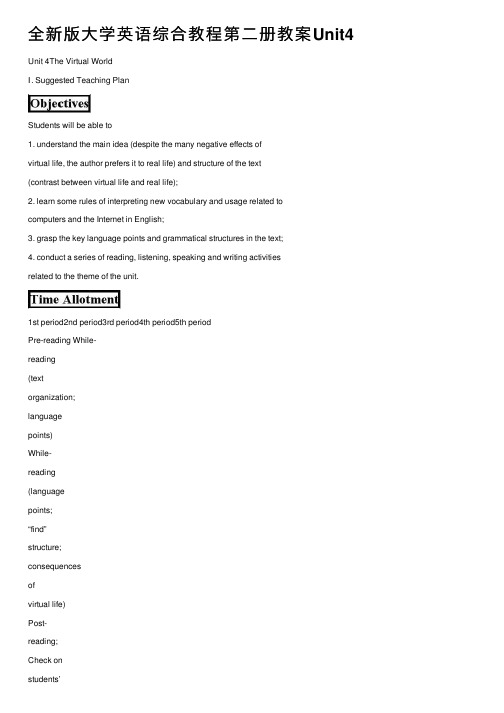
全新版⼤学英语综合教程第⼆册教案Unit4 Unit 4The Virtual WorldⅠ. Suggested Teaching PlanStudents will be able to1. understand the main idea (despite the many negative effects ofvirtual life, the author prefers it to real life) and structure of the text(contrast between virtual life and real life);2. learn some rules of interpreting new vocabulary and usage related tocomputers and the Internet in English;3. grasp the key language points and grammatical structures in the text;4. conduct a series of reading, listening, speaking and writing activitiesrelated to the theme of the unit.1st period2nd period3rd period4th period5th periodPre-reading While-reading(textorganization;languagepoints)While-reading(languagepoints;“find”structure;consequencesofvirtual life)Post-reading;Check onstudents’homereading(Text B)Theme-RelatedLanguageLearn-ing Tasks1. T asks Ss the following questions on the poem Surfing the Internet:(5minutes)* What was the hero doing when his boss came in? (surfing the Internet) * How did he act in front of his boss? (He pretended to be surprised at the computer which had crashed “unexpectedly”.)2. Ss look at the theme of this unit (The Virtual World) and the title of TextA (A Virtual Life), then try to: (10 minutes)* find antonyms of “virtual world” and “virtual life”; (real world, real life) * suggest synonyms for “virtual world”; (cyberspace, cyberia, etherworld, virtual reality, Internet world, net world, etc.)* say what people can do on the Internet, (communicating with people, shopping, reading, entertainment, education, working, hacking, publishing, etc.)3. Imaginative writing(28 minutes)1) T dictates to Ss the following paragraph:For the past two weeks, other participants of the Net Survival Contest (⽹络⽣存竞赛)and I have been shut up in bare hotel rooms.Our only link to the real world has been a computer that is hooked up to the Internet (联⽹电脑). We have relied on it, not only for food, bed sheets and other daily necessities, but also to set up an e-business (电⼦商务)of our own.2) Now Ss will complete the next paragraph beginning with: “Now it istime for me to walk out into the light of day again...” They willgive their imagination full play. They will write no more than 100words.3) Ss form groups of four to five, and read aloud to each other theirown writings.4) T asks some groups to recommend the best piece in their group tothe class.4. T may lead in to Text A by saying: Some of us like to live a life in contact with real things and real people, but others favora virtual existence. Which life is better? I’m sure you have different opinions. Now let’s read Text A to find out what Maia Szalavitz has to say about these two life styles. (2 minutes)1. Text organization (15 minutes)1) T draws Ss’ attention to Text Organization Exercise 1, and lets themread its instructions as well as what has already been done for them in this exercise.2) Ss try to complete the exercise by simply reading the first sentence ofeach paragraph in Text A.1) Ss compare answers with each other; if necessary, T may help.2. T explains the key language points and gives Ss practice (see LanguageStudy). (45 minutes)3. T guides Ss through Structure Exercise 2. (10 minutes)2. Ss re-read Paras 4-10, work in pairs to find out consequences of “my”virtual life. Can they use the “find oneself + adj./ past participle/present participle” structure when summing up the conse-quences? (10 minutes)3. Some pairs report to the class their findings, using the “find” structure.(5 minutes)1. Computer-related vocabulary items (20 minutes)1) Ss scan Text A to find out vocabulary items related to computer andthe Internet. (They are: virtual life, the net, telecommuter, email,Internet mailing lists, computer-assisted, data, link, cyber-interaction, on line, system crash, click on the modem, connection,password)2) T tells Ss that new terms related to computer and the Internet areconstantly added to the English vocabulary, so much so that many ofthem are not included in any English dictionary. However, if weapply certain rules, their meanings are easy to deduce.3) T gives Ss more examples of computer-related vocabulary items (seeText Analysis).2. T guides Ss through some after-text exercises. (25 minutes)3. T checks on Ss’ home reading (Text B). (3 minutes)4. Ss do Part IV: Theme-Related Language Learning Tasks. (1 period)5. T asks Ss to prepare the next unit: (2 minutes)1) do the pre-reading task;2) preview Text A.Ⅱ.Text AnalysisThe most dynamic combining forms/prefixes for new computer-and-Internet-related vocabulary in English are cyber-, virtual, Net- (net-), Web-(web-), and E- (e-).New English vocabulary items derived from them usually appear in the following forms:1. combining forms/prefixes + noun: this is the most common type, e.g.virtual life (虚拟⽣活), virtual world (虚拟世界), virtualcommunity(虚拟社区), virtual office (虚拟办公室), virtual pet (虚拟宠物),virtual reality (虚拟现实),cyber-interaction (⽹络互动),cyberculture(⽹络⽂化),cybernut (⽹⾍), cyberpet(电⼦宠物),cyberspace (⽹络空间), netwriter(发送电⼦邮件的⼈),nethead (⽹⾍), Webmaster (⽹站维护者), Web page (⽹页), website (⽹站),WebTV (⽹络电视机), E-book (电⼦书籍), E-shopper (⽹上购物者), e-card (电⼦贺卡), e(-)mail (电⼦邮件), e-journal (电⼦杂志),e-business (电⼦商务), e-cash (电⼦货币), e-commerce (电⼦商务). 2. combining forms/prefixes + verb: e.g. cybersurf (⽹络漫游), netsurf (⽹络漫游), websurf (⽹络漫游),email (发送电⼦邮件)3. words like cyber, net, etc. + suffix: e.g. cyberian (cyber + ian, ⽹络⽤户), cyberphobia (cyber + phobia, 电脑恐惧症), cybernaut (cyber +naut ⽹络⽤户), netter (net + er ⽹民), Webify (web + fy 使万维⽹化), cyberize (cyber + ize, 使联⽹).4. clipped word: cyberdoc (cyber + doctor, ⽹络医⽣), Netcast (Net +broadcast,⽹络播放), Netiquette (Net + etiquette, ⽹规), Netizen (Net+ citizen, ⽹民,), Netpreneur (Net + entrepreneur, ⽹络企业家),Webcam (Web + camera, ⽹络摄像机), Webcasting (Web + broadcasting,⽹络播放), Webliography (Web + bibliogrpahy, ⽹络书⽬), Webnomics (Web + economics, ⽹络经济), Webzine (Web +magazine, ⽹络杂志), e-tailing (electronic + retailing,电⼦零售), e-zine (electronic + magazine,电⼦杂志)Ⅲ. Cultural Notes1. the Internet: an international computer network for the exchange of information. It was originally used mainly in the academic and military worlds but has since become available to the large and increasing number of people with personal computers. Other services, e.g. the World Wide Web, are available through it.The Internet is changing our lives and a parallel universe is rapidly emerging online. Today there’s scarcely an aspect of our life that isn’t being upended by the torrent of information available on the hundreds of millions of sites crowding the Internet, not to mention its ability to keep us in constant touch with each other via electronic mail. The Internet is saving companies billions of dollars in producing goods and serving the needs of their customers. Nothing like it has been seen since the beginning of the Industrial Revolution, when power-driven machines began producing more in a day than men could turn out in nearly a year. The Internet and e-commerce are viewed as a global megatrend along the lines of the printing press, the telephone, the computer and the electricity.You would be hard pressed to name something that isn’t available on the Internet. Consider: books, health care, movie tickets, baby clothes, stocks, real estate, toys and airline tickets. American kids today are so computer savvy that it virtually ensures the United States will remain the unchallenged leader in cyberspace for the foreseeable future. Most kids use computers to play games and have email chats with friends.What’s clear is that, whether we like it or not, the Internet is an ever-growing part of our lives and there is no turning back. 2. NBC (the National Broadcasting Company): the first of the originalthree US national broadcasting companies. It was established in 1926by Radio Corporation of America as two groups of radio stations. Thefirst NBC television channel opened in 1940. The company is nowowned by General Electric. Its main offices are at Rockefeller Centerin New York.3. PBS (the Public Broadcasting Service): (in the US) a televisionsystem that broadcasts programs to an association of local stationswhich use no television advertisements and do not make a profit. Itwas established by the Public Broadcasting Act and is supported bymoney from the US Government, large companies and the public.PBS is known for the high quality of its programs.4. ABC (the American Broadcasting Company): one of the original threemajor television networks in America. It began in 1943 as the BlueNetwork of six radio stations. ABC is now owned by the Walt DisneyCompany .Ⅳ. Language Study1. virtual: 1) created and existing only in a computerExamples: I can visit a virtual store and put what I want in my basket atthe click of a mouse button.Some people spend too much time escaping from reality intothe virtual world conjured up on their computer screens.2) being or acting as what is described, but not accepted as such inname or officiallyExamples: Our deputy manager is the virtual head of the business.Now that the talks have broken down, war in the region looks like a virtual certainty.2. interpret: 1) understand (sth. said, ordered, or done)Examples: They are worried that the students might interpret the new regulation as a restriction of their rights. She interprets the dream as an unconscious desire to be young again.2) give or provide the meaning of,explainExamples: How do you interpret his refusal tosee us?This dream can be interpreted in several different ways.3) translate what is said in one language into anotherExamples: I am terribly sorry, but I don’t understand a word. Could you interpret for me?No one in the tour group spoke Spanish so we had to ask the guide to interpret.3. tone: a particular quality or intonation of the voiceExamples: From the tone of her voice I could tell she was very angry.Suddenly he laughed again, but this time with a cold, sharptone.4. stretch: (cause to) become longer, wider, etc. without breakingExamples: My working day stretches from seven in the morning toeight at night.The child stretched the rubber band to its full extent.5. submit: give (sth.) to sb. so that it may be formally considered (followed by to)Examples: You should submit your reports to the committee.I am going to submit an application for that job in Microsoft.Peter submitted his plans for the new town square to the local government.6. edit: revise or correctExamples: Jack is busy editing Shakespeare’s plays for use in schools.John didn’t finish editing the annual report until the end of lastmonth.7. email: electronic mailExamples: Young people like to keep in touch with their friends via email.I received an email from my studentyesterday.vt. send an email toExamples: I will email you the instant I get thenews.She’ll email me a question before she calls so I can think it overin advance.8. communicate: contact sb. in any way, esp. by speaking to them, writing to them or calling them (followed by with) Examples: Some young people depend heavily on email to communicate with each other.They have been divorced for years and never communicated with each other.9. the Internet: the worldwide network of computer links which allows computer users to connect with computers all over the world, and which carries electronic mailExamples: Whether we like it or not, the Internet is an ever-growing partof our lives.You can take online courses and earn your degree via theInternet whenever and wherever you want to.It’s believed the Internet was born in 1969 when twocomputers at the University of California, Los Angeles wereconnected by a 15 foot cable.10. relationship: state of being connectedExamples: What is the relationship between language and thought?The scientist had a good working relationship with his Americancolleagues.11. at times: sometimesExamples: She has been away from her home for about a year. At times she wishes she had never left. He went on listening to her, at times impatient and at times fascinated.12. take in: absorb (sth.) into the body by breathingor swallowingExamples: The earth takes in heat and light fromthe sun.Fish take in oxygen through their gills.13. data: information, usu. in the form of facts or statistics thatyou can analyzeExamples: This data is stored on the network and can beaccessed by anybody.The data is still being analyzed, so I can’t tell you the results.14. spit: send (liquid, food, etc.) out from the mouth (used in the pattern: spitsth. (out) (at/on/onto sbJsth.))Examples: The baby spat its food out on the table.He took one sip of the wine and spat it out.15. on line: connected to or controlled by a computer(network)Examples: Our system is on line to the maincomputer.The largest online institution is the University of Phoenix, withsome 1000 students today and hopes of reaching 200,000 studentsin 10 years.16. symptom: 1) sign of the existence of sth. badExamples: High interest rates are a symptom of a weak economy.They regard the increase in crime as a symptom of a more generaldecline in moral standards.2) change in the body that indicates an illnessExamples: A cold, fever and headache are the usualsymptoms of flu.If the symptoms persist, it is important to go to your doctor.17. nightmare: a terrifying dreamExamples: Tom didn’t eat fish because it gives him nightmares.Watching horror films gives menightmares.I had a nightmare about falling off theskyscraper.18. conversely: in a way that is opposite to sth.Examples: $1 will buy 100 yen worth of Japanese goods. Conversely, 100 yen will buy $1 worth of American goods. You can add the fluid to the powder or, conversely, the powder to the fluid.19. but then: yet at the same timeExamples: The failure of China’s soccer team looks inevitable. But then, anything can happen in football.Mary performed better than the others in the final exam; but then,she spent much longer on it than they did.20. jar: have a harsh or an unpleasant effect (used in the pattern: jarsth., jar on sbJsth.)Examples: You shouldn’t have too many colors in a small space as the effect can jar.The loud bang jarred my nerves.Her squeaky voice jarred on me.21. suck in: (usu. passive) involve (sb.) in an activity, an argument, etc., usu.against their will (used in the pattern: suck sb. in/into sth.; suck in)Examples: I don’t want to get sucked into the debate about school reform.Some teenagers don’t want to get involved with gangs, but theyfind themselves getting sucked in.22. keep up with: learn about or be aware of (thenews, etc.)Examples: Carrie likes to keep up with the latestfashions.He didn’t bother to keep up with the news. His only concern wasto study.23. Work moves into the background: Work becomes secondary to me.24. in sight: 1) visibleExamples: It was early in the morning and there wasn’t anyone in sight oncampus.As the train pulled into the station my parents standing on theplatform were soon in sight.2) likely to come soonExamples: Two months passed, and victory was not yetin sight.The end of the economic nightmare is still nowhere in sight.A solution to the problem of environmental pollution now seemsin sight.25. remark: thing said or written as a commentExamples: The principal of the school made some remarks about educational reform at the meeting. Mr. Smith approached us and made a couple of remarks aboutthe weather.His rude remark about my book jarred on me.26. emotional: 1) of the emotionsExamples: She is grateful to him for his emotional support while she wasin trouble.It’s quite difficult to handle emotional problems.2) having emotions that are easily excitedExamples: Marie got very emotional when we parted, andstarted to cry.It’s said that the Italians are more emotional than we are.27. cue: anything that serves as a signal about what to do or say (followedby to / for)Examples: When he started to talk about the finances, that was our cue toget up quietly and leave.When I nod my head, that’s your cue to giveflowers to him.Mr. Clinton’s excitement was the cue for acampaign.28.1 say a line: I type a line on the screen.29. routine: a fixed and regular way of doing things (oftenadjectival)Examples: The job is really just a dull series of fairly routine tasks. I don’t think you’ll take it.He established a new routine after retirement.30. rely on/upon: depend confidently on, put trust inExamples: Nowadays we rely increasingly on computers to control theflow of traffic.Some children relied heavily on the advice of theirparents.31.abuse: wrong or bad use or treatment of sth./sb.Examples: The World Health Organization (WHO) has published a report on drug abuse and addiction.The policemen are making an investigationof child abuse.32. restore: bring back to a former condition (used in the pattern: restoresth.; restore sb. to sth.)Examples: Law and order will be quickly restored after the incident.Winning three games restored their confidence.Doing sports every day restored the old man to good health.The deposed king was restored to power.33. arrange: prepare or plan (used in the pattern: arrange sth.; arrange todo sth.; arrange for sb./ sth. to do sth.)Examples: Her marriage was arranged by her parents.Let’s arrange to have a dinner together some time before wegraduate.I have arranged for a taxi to pick us up at 8:00 a.m.I could arrange for you to come along with us if you like.34. flee: run away (from) (used in the pattern: flee from/to; fleesomeplace)Examples: The customers fled from the bank when the alarmsounded.During the war, thousands upon thousands of Afghans fled the country.Up to five million political refugees have fled to other countries.35. interview: 1) a meeting at which a journalist asks sb. questions inorder to find out their newsExamples: In an exclusive interview with our reporter, the film star revealed some of his personal affairs.Radio interviews are generally more relaxed than television ones.2) a formal meeting at which sb. applying for a job is askedquestions, as a way of judging how suitable they are Examples: I have been asked to go for an interview for a project I applied for at Harvard University.She has had a couple of job interviews, but nooffers.v.Examples: As a journalist, he interviewed manygovernment officials.After the press conference, the journalist interviewed the UN Secretary General about the Israeli-Palestinian conflict.I will be interviewed next week for the Chief Executive’s job.36. appointment: an arrangement to meet or visit sb. at a particular time (followed by with)Examples: You can’t see the president of the university unless you make an appointment.I’ve made an appointment to see my tutor tomorrow.37. click: press or release a mouse button rapidly, as to select an icon (followed by on)Example: When shopping online, you just click the mouse and order what you want to buy.38. tune: a series of musical notes that is pleasant andeasy to rememberExamples: She whistled a happy tune all the wayhome.He was humming a merry tune while cooking.。
全新版大学英语综合教程第二册教案Unit-5-book2
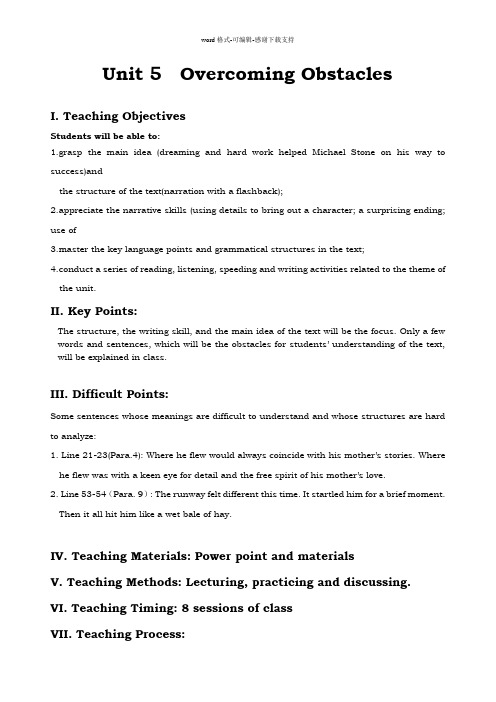
Unit 5 Overcoming ObstaclesI. Teaching ObjectivesStudents will be able to:1.grasp the main idea (dreaming and hard work helped Michael Stone on his way to success)andthe structure of the text(narration with a flashback);2.appreciate the narrative skills (using details to bring out a character; a surprising ending; use of3.master the key language points and grammatical structures in the text;4.conduct a series of reading, listening, speeding and writing activities related to the theme of the unit.II. Key Points:The structure, the writing skill, and the main idea of the text will be the focus. Only a few words and sentences, which will be the obstacles for students’ understanding of the text, will be explained in class.III. Difficult Points:Some sentences whose meanings are difficult to understand and whose structures are hard to analyze:1. Line 21-23(Para.4): Where he flew would always coincide with his mother’s stories. Where he flew was with a keen eye for detail and the free spirit of his mo ther’s love.2. Line 53-54(Para. 9): The runway felt different this time. It startled him for a brief moment. Then it all hit him like a wet bale of hay.IV. Teaching Materials: Power point and materialsV. Teaching Methods: Lecturing, practicing and discussing.VI. Teaching Timing: 8 sessions of classVII. Teaching Process:1st -2nd periods:Pre-reading; Teacher’s Introductory Remarks and Students’ Discussion related to the topic.3rd -4th periods: While-Reading (Understanding the title of text A; Analyzing the organization of the text; Explaining Difficult sentences and language points in the text; Summing up the main idea of the text)5th-6th periods: Dealing with the exercises after Text A. Check on Ss’ home reading (Text B); Post-Reading Task: Theme-Related Language Learning Tasks7th-8th periods: Listening and speaking tasks.A. Pre-reading tasks1.T asks SS the following questions on the song Coming out Dark:(5minutes)Consider the title of the song, what does "Dark" refer to?(near death ;loss of consciousness after the car accident; slow and painful recovery; despair)How is the song related to the theme of he unit?(To get over despair after injury is also a form of overcoming obstacles.)2.Do you know these proverbs??(13minutes)1)T dictates the following Proverbs to SS:Where there's a will, there's a way.(有志者事竟成。
全新版大学英语综合教程教案1-unit2
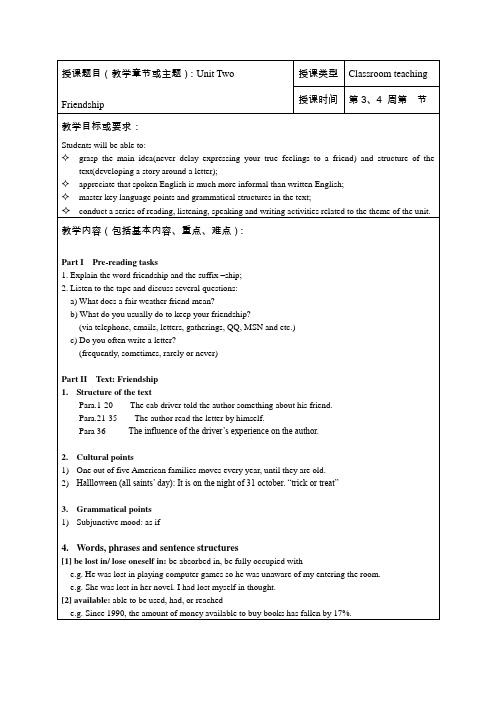
[5] know/ learn (sth.) by heart:memorize, remember exactly
e.g. You have to know all the music by heart if you want to be a concert pianist.
2)Hallloween (all saints’ day): It is on the night of 31 october. “trick or treat”
3.Grammatical points
1)Subjunctive mood: as if
4.Words, phrases and sentence structures
教学内容(包括基本内容、重点、难点):
Part I Pre-reading tasks
1. Explain the word friendship and the suffix –ship;
2. Listen to the tape and discuss several questions:
a) What does a fair weather friend mean?
[3] or something:used when you are not very sure about what you have just said
e.g. The air fare was a hundred and ninety-nine pounds or something.
e.g Here's some money. Get yourself a sandwich or something.
- 1、下载文档前请自行甄别文档内容的完整性,平台不提供额外的编辑、内容补充、找答案等附加服务。
- 2、"仅部分预览"的文档,不可在线预览部分如存在完整性等问题,可反馈申请退款(可完整预览的文档不适用该条件!)。
- 3、如文档侵犯您的权益,请联系客服反馈,我们会尽快为您处理(人工客服工作时间:9:00-18:30)。
Teaching PlanningCollege English Integrated CourseBook Three Unit TwoThe Freedom GiversZhong wen1.Background InformationTeacher: zhong wenStudents: 56 sophomoresContent of the textbook: unit-2 text A the Freedom GiversTextbook: foreign language teaching and research pressTime duration:10 minutes2.Textbook AnalysisThe author tells three stories about the Underground Railroad and early Black civil rights movement. The three stories are chosen because they are representative of all participants in this movement: John Parke r is a freed slave who later turned into a courageous “conductor”; Levi Coffin is a brave white “conductor”; Josiah Henson is a slave who struggled his way to freedom with the help of the Underground Railroad.We learn about the name of Josiah Henson at the beginning of the text, yet his full story is not told until the last part. In this way the author achieves coherence of text.3.Students AnalysisThe class is made up of 56 students, with 30 girls and 26 boys ,who have a good knowledge of Basic English, but know very little about the American culture behind the language. So in this introduction part, It is necessary to introduce some background information to the students before reading4.Teaching ObjectivesStudents will be able to:1.understand the main idea(early civil-rights struggles in the US, esp. the undergroundRailroad)2.grasp the key language points and grammatical structures in the text,3.conduct a series of reading, listening, speaking and writing activities related to thetheme of the unit4.Appreciate the various techniques employed by the writer (comparison and contrast,topic sentence followed by detail sentences, use of transitional devices,etc.);5.Teaching Procedures:GreetingsStep 1 Lead-inT: Today we are going to talk about the ethic heroes in American history, before the class, I’d like to introduce the slavery to all of you.T: Abraham Lincoln was the 16th president of the United States, during his term of office; he led the civil war and abolished the slavery.T: In the battle against slavery, not only did the president try his best to abolish this system, but also the people, especially the black people living in the South America try hard to fight for their own feat. Today, we will introduce some freedom givers in the American history. Beforethe Civil War, a secret system was used in the US to help thousands of slaves to escape to the free northern states or Canada. The slaves were called “passengers”, the people who helped them were “conductors”, and the salves hid in “stations”(safe houses) along the way. And this passage will introduce three heroes escaping or helping others escaping by this Underground Railroad. Please turn to page 34.Step 2 while- reading taskT: Scan the passage to see if there is any division between parts of the texts. (There is a blank line between each part)S…T: We can see that there are four parts in this passage, please scan the passage again and pay attention to the every first and last paragraph of each part, then tell me the name of the three heroes and in which paragraph they were described.S…T: We learn about the name of Josiah Henson at the beginning of the text, yet his full story is not told until the last part. In this way the author achieves coherence of text. Now we will havea intensive reading of part I and par tⅣtogether and learn what happened on Josiah Henson.Before reading, we will learn these new words.S:…T: OK ,now read the part I and par tⅣagain and try to find out all of the information of Josiah HensonS:… since time is limited, we will discuses about Josiah and the other two heroes next time, see you.Step 3: post-reading tasksT asks Ss to prepare the next two parts.nguage Study1.slender:adj1) thin and gracefuleg: She has a long slender neck.2)not enough to be useful, helpful, or effective★slender chance/ hopeeg: The company now only has a slender hope of survival.2.settlement:n1)a small village in an area with few peopleeg: a settlement on the edge of the desert2)the movement of a new population into a place to live thereeg: the settlement of the American West3)an agreement or decision ending an argument, question, etceg:After the settlement of our differences, we became friends.3.confident:adj「+that/of」having a belief in one’s own powers or abilityeg:The government is confident of winning/ that it will win the next election.cf: confidential: adj(spoken or written in secret; to be kept secret)★keep sth confidentialeg:Doctors are required to keep patients’records completelyconfidential.4.devote:v1) devote time/ effort/ money etc to(use your time, effort etc in order to do sth or help sth be successful)eg:I’m devoting all my time and energy to being a mom right now.2)devote oneself to (to do everything you can to achieve sth or help someone)eg: She has devoted herself to caring for the poor.5.historic:adj(important in history)eg: a historic meeting between two leadershistorical: adj1)which represents a fact/ facts of historyeg: a historical play2)connected with history as a studyeg: He gave all his historical papers to the library.6. Escape:v1) 「+from」to find a way out; get outeg: They escaped from the burning house.2) 「+v-ing」(of a person) to avoideg:He narrowly escaped being drowned.3)(of an event, a fact, etc.) to be unnoticed or forgotten byeg: Nothing escaped his attention.cf: fleeeg: The enemy soldiers were fleeing in all directions, but few of them could escape.。
